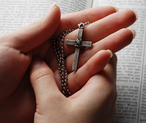
Helped Make Trump President
David French, Attorney
National Review - November 17, 2016
(Dreamstime Image: Theodor38)
They have only themselves to blame for driving away millions of Evangelicals.
Last week, my friends and former colleagues at the Alliance Defending Freedom filed a lawsuit against the University of Wisconsin-Eau Claire. The facts of the case aren’t terribly exciting: The university, like many universities, has a mandatory “service learning” program that requires students to perform 30 hours of community service, and it uses the program as a thinly disguised means of astroturfing student activism. The program specifically encourages students to work with “public interest” organizations, political campaigns, “environmental action” groups, and other nonprofits — but it doesn’t grant credit to students for promoting “religious doctrine” or “proselytizing.” In other words, students can and do promote ideological, cultural, or political causes, but they cannot promote their religious faith.
Two students who’d performed dozens of hours of service at Catholic parishes, teaching children about the basics of the Catholic faith, church history, and morality filed suit, noting that they would have received credit for the same services if performed in a non-religious context. The case is now pending in federal court.
It’s easy to identify the few lawsuits that get media attention, but there are dozens — even hundreds — of others across the country that go unnoticed. There is a pervasive feeling among American Christians that secular progressives will actively seek out new and creative ways to persecute and marginalize them.
Millions of American Christians understand that if you work for a state or local governments — or even for private companies — publicly vocalizing traditional Christian views of sexual morality can cost you your job, even as outspoken support for radically new sexual morality is lauded. If you start a Christian group on campus, administrators by the hundreds will deem you “discriminatory” and “bigoted” for daring to assert that it should be run by Christians. Meanwhile, liberal activist groups operate with impunity, often coordinating their well-funded efforts with university administrators and faculty. If you attend a Christian college, secular-progressive academic regulators may well pressure your university to break with Christian orthodoxy as a condition of receiving state funds or even of maintaining accreditation.
If you’re a Christian who runs a business, you’re exactly one decision or one statement away not just from vicious social-media shame campaigns and boycotts but also from vengeful state action that could close your store and bankrupt your family. If you’re a Christian applying for a job in higher education, you can expect doors to be slammed in your face, less-qualified candidates to enjoy greater opportunities, and hostile faculties and administrations to sometimes ask probing or even illegal questions about your “bigotry.”
If you’re a church pastor, you must wonder which of your ministries could be attacked by local activists, and whether the very act of serving the poorest and most vulnerable citizens is perversely opening your church to legal attack.
In short, orthodox Christians feel as if they’re under cultural and legal siege because they are. Sixteen years ago, when I first starting defending religious liberty and free speech on college campuses, I would speak at churches and describe a mindset in which campus administrators and activists actively compared faithful-Christian student groups to the Ku Klux Klan. Audiences shook their heads in disbelief. They couldn’t imagine such a hysterical onslaught, and it felt distant, removed from their daily lives. No one shakes their head now. And with all the social pressures on the left driving Democratic politicians to ever-more-vicious acts of religious persecution, the election of 2016 presented conservative Christians with nothing but terrible options: Vote for an immoral man who might help, vote for an immoral woman who will try to hurt, or vote for someone decent who can’t win.
Make no mistake, Donald Trump is president-elect in part because Evangelicals gave him their votes by a record margin. In an election this close, you can’t pin victory or defeat on any one group, but there is little doubt that had wavering Evangelicals not gone for Trump, his path to victory would have grown much narrower. The lesson here is clear: When the Left comprehensively and enthusiastically attacks millions of Americans, it forfeits any and all ability to reach those Americans for any purpose, much less to earn their votes.
Ironically enough, however, the short-term result of the election is likely to be an increase in religious persecution. While the Obama administration was hostile to religious liberty, the overwhelming majority of lawless acts occur in the deep-blue urban and cultural centers that are most enraged by the Trump win and are responding with sheer panic and fury. While some thoughtful leftists are opening their hearts to the need for greater tolerance and understanding, others are busy comparing Trump voters to lynch mobs, doing their best to poison a new generation of Americans against the church.
There is no easy way out of this escalating culture war. To the secular left, Trump’s election proves that Evangelicals don’t mean what they say about character, sexual morality, and love for their neighbors. The distraught Evangelical voter responds that liberal bigotry forced him to vote for Trump, despite his many manifest failings. I may believe that Christians had better options, but I know that my own friends and neighbors disagreed. They in good faith believed that a vote for Trump was the only rational way to protect life and liberty. So, yes, leftist radicals are right when they say that “hate” helped turn the 2016 election. But it was their own malice and intolerance that proved decisive. They chant that “love trumps hate,” but in reality their hate sunk Hillary.
They say a bigot is in the White House, but their own bigotry helped put him there.
— David French is an attorney, and a staff writer at National Review.

 RSS Feed
RSS Feed
